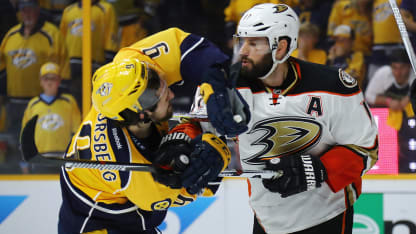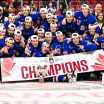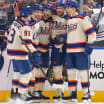Payne thought Ducks defenseman Cam Fowler, who played a team-high 28:10 and set up their first goal, was a dominant player in Game 4. It was the most comfortable Fowler has looked since returning from his knee injury, sustained late in the regular season.
The return of Ducks defenseman Kevin Bieksa also was something of an X factor. Bieksa had been out since sustaining a knee injury April 26, the first game of the second round against the Edmonton Oilers.
"We've always known [Bieksa] to have a physical effect for their hockey team, to have an emotional effect on their hockey team," Payne said. "Anaheim had a clear purpose in denying Nashville the ability to get to the net. We call them box outs.
"It was very difficult for the Nashville guys to get to the net. That is probably one of the things Kevin Bieksa does best. Get that game into the trenches and try to beat them off of walls and to the net. He's very good at that. He makes it a hard, miserable place to go and as a result, not only was [Ducks goaltender] John Gibson good, he didn't have to deal with what he dealt with in Game 3."
Payne also referenced something he noted in Game 2 from the Ducks. It was the second thing he wrote down from the start of the game, and it surfaced again in overtime in Game 4 when Ducks forward Corey Perry scored.
"I think Anaheim has a game plan to put that puck to the net from that angle on [Predators goaltender] Pekka Rinne, expecting rebounds, commotion, second-chance opportunities," Payne said. "Perry scored a goal off an angle off the power play the game before.
"Putting that puck to his feet and forcing him to deal with those loose pucks I believe is part of their game plan. They didn't just do it [Thursday}. They did it two games ago. They were putting the puck to the net, off an angle, whether it was from the rush or in the offensive zone.
"They're putting that pressure to Rinne, it forces the defenders to have to turn around and find coverage, find pucks, and it puts a lot of pressure on the other team."


















